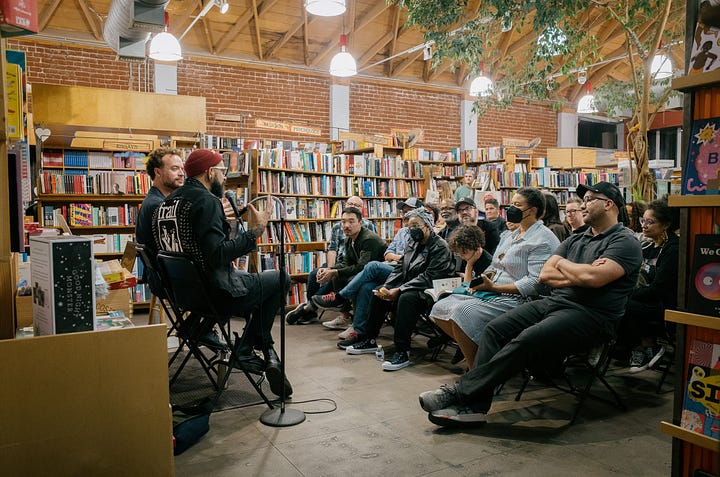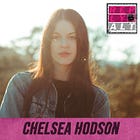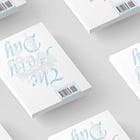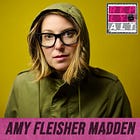An interview with James Spooner (Black Punk Now, The High Desert)
Talking about punk ethics, generational music shifts, and the symbiotic relationship between the mainstream and the underground.
Hello and welcome to REPLY ALT, the only and therefore greatest newsletter about music in the entire world. Every week I publish a column about rock books for my paid subscribers, but today’s edition is open to everyone! Consider subscribing if you haven’t already. Also, don’t forget about the 20% off sale I’m running on records, zines, books, etc. in my store It runs through Monday.
Last summer I was sent a copy of The High Desert, a graphic novel memoir by Afropunk cofounder James Spooner. The book documents his youth spent discovering punk as one of the few Black teenagers in a dead-end California desert suburb. Even though I am not Black, didn’t grow up anywhere near a desert or California, and almost never read graphic novels, I found myself seeing a lot of myself on the pages. Spooner does an impressively authentic job of capturing an experience millions of outsider kids had, particularly in the 90s—being drawn to countercultural ideas and immersing yourself in an exciting world of new terms. Punk? Zines? Vegan? It all sounds exciting even though you’re unsure what the hell most of it even means.
Spooner and co-author Chris Terry just released Black Punk Now, an anthology packed with interviews, roundtables, and comics by Black writers which aims to capture the current state of the scene. I had a chat with him about his books, how to accurately capture youth in a memoir, and the symbiotic relationship between the mainstream and the underground.
After I read The High Desert I was moved to write you an email because I felt a deep sense of connection, specifically to how you captured the way in which young people find punk. But I can't imagine what it must feel like for a Black person to see themselves on these pages. How has the reaction been since this book was published?
James Spooner: It's been nothing but positive. I've definitely gotten beautiful emails from people who feel seen and validated. I was surprised to find how many people were from in and around the desert. I had put the desert behind me. It was so, so long ago that it almost feels like a different person. And once I left, I never really looked back. So it's been a beautiful surprise to hear from people who are in that Apple Valley, Victorville, Hesperia area, who are sending me pictures of the book up against pictures of the same places. So that's rewarding to know that it’s validating people's experience, just from being from a place.
The High Desert documents your own teenage years and your own upbringing, but then you have this comic in Black Punk Now about your daughter, who is the age that you were in The High Desert. And it deals with her struggles with race in relation to the culture that she consumes. Do you think that she and her generation have it any easier or any better or worse than you did in the 90s?
I think it's better. I think that there are some things that just permeate throughout the ages. But where [my daughter] and her generation has it better is that there's so much more diversity in the scene, and even more important than that is that the conversation around race has changed. I felt like in the 90s, the thing that all the kids of color had in common was that they didn't talk about being kids of color. We didn't want to make the white kids feel uncomfortable. And now I feel like the conversation is like: This is our experience, and you're welcome to join in. Like, if you go to a Soul Glo show or a ZULU show, you have to feel like: Oh, I am in a Black moment. This is like going to a cookout. Those people are unabashedly Black folks talking about Black things, and if you're not Black and you're in the audience, you have to be comfortable with that. That's a huge shift. I don't think going to a Bad Brains show back in the day had the same energy. I wasn't around for those early Bad Brains shows, but when they would do something that was authentically Black, like playing reggae songs, I've heard from many people that they got a lot of boos and people walking out. They didn’t want to hear that shit. And that’s why Chris and I decided to make Black Punk Now, to document what’s happening now.
What's the most surprising change that you've noticed in the way your daughter’s generation consumes new music or finds new cultures?
My only reference point is her, but when I think about the surprising stuff, it's just how deep in the crates she can go without having context for stuff. I always let her play music on the drive to and from school, and I'm interested in whatever she's finding out in the world. The other day, she put on this 90s band called Breakwater. They only have like four songs recorded. And what was shocking was not only did she find it, but this is a band that I went on tour with. And she had no idea. Our friend in the Bay Area, Nina, put out their record when she was like 16 or something. And I'm like, “How do you know about this?”
She has experiences where, like, she told me the other day that she was trying to have a music conversation with this skater boy. And she was like, “What do you listen to?” And he gave her the old, “Oh you wouldn’t know ‘em.” And she was like, “Well, I know about music. What do you like?” And he was like, “Really obscure stuff. Do you know Bad Brains?” And she just laughed in his face.
Something that I really loved about The High Desert is that it's an honest reflection on youth. I feel like a lot of memoirs read like an adult doing revisionist history to make themselves sound cooler or better than they actually were at the time. But I don't think yours does that. What was your process when writing it? How are you able to intimately connect to your younger self in an authentic way?
Well, thank you. I appreciate that. I think the first thing is that it's far enough away that I can be honest and not be embarrassed. My ego can step aside and be like, yeah, I said and thought those cringy things or those politically incorrect things or whatever. With that book, the way that I did it was, first I wrote a script with no narration. I was trying very hard to have a standalone story that was just teenagers existing, and I even drew it all that way. I didn't put the narration in until I finished all the drawings and everything, which was a little backwards and definitely took some finagling in some pages. But my partner kept reading it and being like, “This feels like a teen drama.” Which is fine if you're trying to write a YA book or something, but if you're doing a memoir, you'll probably want to insert an adult voice in here to give context for things. The more that I started adding it, the stronger the piece got.
So I think it's just starting by allowing yourself to be vulnerable. There were moments where I was worried, like, “Am I making myself out to be too cool here?” And I would try to think about things that I did that were fucked up, like when I wasn't there for Melody. I don't want to give away the story, but when she really needed a friend and I just ghosted her, I felt like I should put that in there because it makes me more real. The other thing that I worried about is that I'm talking about extreme racists in this book and I was afraid that people might read it and dismiss it as something that didn't really happen.
Like it was exaggerated or something.
Yeah. So I felt like the more I could show that I was also flawed, and the more I could add empathy, like… Ethan, the skinhead character, you have empathy for him at times. It’s easier to swallow that everything about it is true.
To make a reader empathize with a skinhead character, obviously, is a very hard line to walk. I was really amazed at how you pulled it off. And I think one of the ways you did that was highlighting that when young people find new subcultures, they're almost attracted to the things about them they don't understand, and then before they know it, they're deep in it. When you see the skinhead kid in this book, you can tell that that's what happened to him. He just went along with something he didn't understand, and then he just got too deep into it. And you really feel for him, you know?
Yeah. Plus, this stuff is learned, right? People aren't born racist. He's got this older brother who he’s trying to impress. And even with George, the older brother, I tried to give him some reasons, like the story about him going after Ty's older sister, who is Black, several years back. Because it’s like, yeah, there's a lot of Nazis who also are trying to date people of color, and people's egos get in the way when they're rejected. So I tried to just make everybody human.
Out of curiosity, the characters that you document in The High Desert, whether they were real or just based on people you know, do you keep up with what those people are doing today?
So, basically everybody in the book is real. Like, I based Ty, my best friend in the book, on two different people, two good friends of mine that I made into one. And I've been in touch with both of them. Melody is the same thing, two different people. George and Ethan are actually one person and I split them in half because I did think it was going to be too hard for us to empathize with him as just this asshole skinhead. Also, I saw him as two people. Like, he was a friend, but he was also doing this fucked up shit, you know? So I haven't been in touch with him. Everybody who I have been in touch with is like, “Yeah, that dude's fucked up. I wouldn't reach out to him.” But if the question is, where are they now? The ones who left after high school are fine. The ones who stayed are struggling. They got into drugs, there’s mental illness, there’s teen pregnancy. You live in a town where there’s nothing to do but get in trouble, you’re gonna get in trouble.


Shifting to Black Punk Now, there's this line in it from Hanif [Abdurraqib] that I thought was so funny, where he says that “the debate of what does or doesn't make one ‘punk’ is the least interesting debate that can be had.” I completely agree with that, but I am also going to break it to ask you something. At your book launch party the other day, you said that by virtue of being released by a major publisher, this book inherently is not punk. Can you explain that?
I think that bands can get really upset and offended. If they came from the underground and then they signed to a major label—you know this from your book—they want to hold on to their punk cred, and there's all these people who are trying to take away their punk card. Like, “You sold out.” For me, Jawbreaker’s Dear You is my favorite of their records. It was in the 90s and it is today. I like the other stuff too, for sure, but I feel like that's a great record. I also am comfortable saying that they weren't a punk band anymore. And I don't think they changed their sound so drastically that that is the qualifier. It's just that it came out through the mainstream, and I believe that punk rock exists in the underground. So if I apply that to myself, I made a book—I made a couple books—that are about punk, that are promoting punk rock ideals, ethics, and morals, but are not punk. Because it’s released through HarperCollins. HarperCollins is owned by Rupert Murdoch. There’s nothing less punk than him. [Laughs]
But can punk ethics be applied to how you operate within more mainstream confines?
Absolutely. I think that you absolutely can and should apply all the politics and ethics that we learned in punk to real life. This is just my definition. Everyone can have their own. But for me, I'm very comfortable with saying that, like, I'm a punk rocker who speaks at universities, but that's not a punk rock speaking engagement. You know what I'm saying?
I came up in a time period where there was a conversation about, if a record label uses barcodes, then it's not punk. And I fully agreed with that then. And I understood why, because we were part of an underground distribution network that didn't need to rely on the mainstream. I have no problem with the bands who had barcodes on their records. And I wouldn't even say that those bands weren't punk, but I might say that those records weren't.
Not to blame everything on the internet, but those lines that we grew up learning about in the 90s really got blurred and obscured. In a way, I feel like we lost the war. We lost the war to tech and to big corporations and now they have their claws in everything we do—in how we release music and how we release books and literature. I don't even know where the line is anymore. It seems like the water is tainted.
Yeah, absolutely. We live in a toxic world. I don’t think anyone should fault anyone else for impurity. But when you go to a show in a basement or in a backyard or at a house or at VFW Hall, you know that energy and how different that energy is from a traditional venue or a huge corporate-sponsored festival. Those just have different energies. It doesn't have to be a judgment to say something isn’t punk. When I say that, I mean it isn’t underground, and I think that’s an easier pill to swallow. Like, Warped Tour isn't underground. No one can debate that. Clearly, it's not underground. But if I say it's not punk, then everyone's all angry.
Has any of this thinking been shaped by your experience with Afropunk? You've been pretty critical about the more commercial direction the festival took as you became less involved in it.
Yeah, I mean, I have firsthand experience with building a community and watching them be displaced by financial motivation. For me, it’s interesting, because I see what Afropunk is today, and as an outsider, I'm not mad. Why shouldn't 100,000 black people have a good time to alt R&B? No problem. The problem comes in if you know how it got there. Today's corporate, multi-million dollar international brand came from the pain of young Black punk kids who were looking for a community, built it together, and then were discarded once there were enough numbers to get corporate sponsorship. And I had conversations where I was like, “Our community is not going to like this” and the response was, “Yeah, but we will get three times as many people doing this, so who gives a fuck about those people?” So when you understand that corporations don't care about community, they don't care about individuals, they just care about numbers, then it becomes really easy to be like, yeah, that's definitely not punk.
But looking at the positive of it, if there is one, it's kind of good because it keeps the underground in a state of continual reinvention, if nothing else.
That is something that took me probably 12 to 15 years to see the silver lining of, which was actually the whole reason that I'm writing the book that I'm currently writing. I set something into motion that was so corporate and so disappointing that the underground reacted and started their own thing. And now, at my last count, there are 12 active Black and brown punk festivals happening around the country and parts of Europe. And when I talked to all of those promoters—incidentally, most of them are Black women—they all had the story of going to Afropunk and being really disappointed by it and starting their own thing. In 2003, when I released Afro-Punk, or in 2001, when I came up with the idea of making Afro-Punk, I wouldn't have had to do that if those festivals or communities existed. Something that I learned along the way is that the underground and the mainstream are feeding off of one another, and there is a beauty in that for sure.
So do you think in a weird, ironic way, Afropunk had to go corporate for it to have its true, full impact?
Yeah, I mean, I understand that even if I'm critical, on just on a personal level, I owe my livelihood to it. I'm still able to talk about the importance of Black representation in underground movements because of that name. I also recognize that if left to my devices, I was getting burned out, and I might have stepped away and it might have just fizzled, and it very well could have been another blip in New York history.
Back to Black Punk Now, you have this interview with Brontez Purnell in here, and you asked him if he felt like a fraud as an artist. I'm wondering where that came from. Have you ever felt fraudulent as an artist?
Yeah, I think every artist is waiting to be found out. Everyone I know is like, “Wait, I get to do this?” I'm just waiting to get found out, you know?
How do you overcome that?
I mean, you just keep making authentic work. When it comes to all the work I've done, I'm usually learning on the job. The High Desert is my first comic. And I'm walking into the comics world with all these people who have been making comics for 20 years, or people who have been reading comics for their whole lives. And I'm like, “I don't know anything about Spider-Man or whatever.” So I hope that they accept me. I hope that my style or the way that I draw is okay in this world. There's a lot of unknowns that I'm just waiting to get called out on and be told I'm not legitimate, you know?
Black Punk Now seems like something that could keep going as a series. Would you want to do that, maybe even handing the reins over to somebody else to do it?
Yeah, I mean, I know Chris had that in mind. We have 30-something contributors because that's how many we had, but there could definitely be 30 new ones that pop up. I try not to say no to stuff, so let's see where we are, what the demand is, where I am personally, and how many other projects I've got going on at that moment. I think that the great thing about doing an anthology is that there's always more perspectives.
This interview has been edited for length and clarity. All photos by me except sections from Black Punk Now, which are courtesy of James Spooner. Please don’t use either without permission, thanks!
More author interviews:
Follow me on the internet. Instagram | Threads | Bluesky | Twitter | Website
Get my book SELLOUT at Bookshop, Barnes & Noble, or Amazon.







